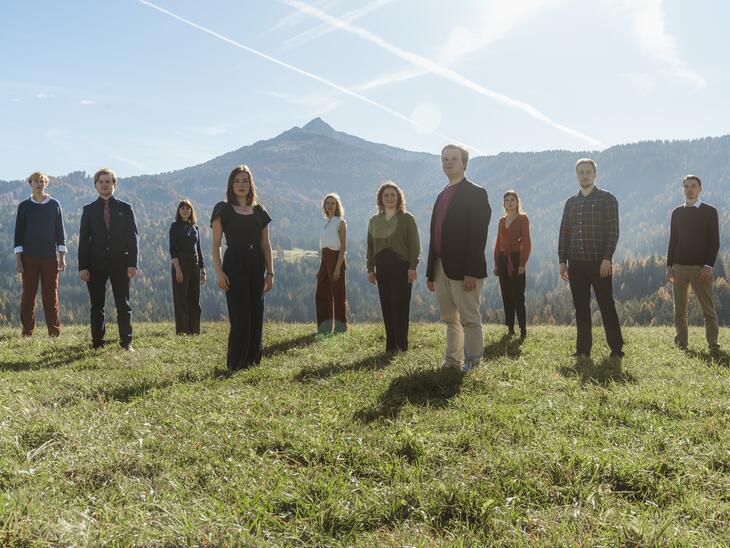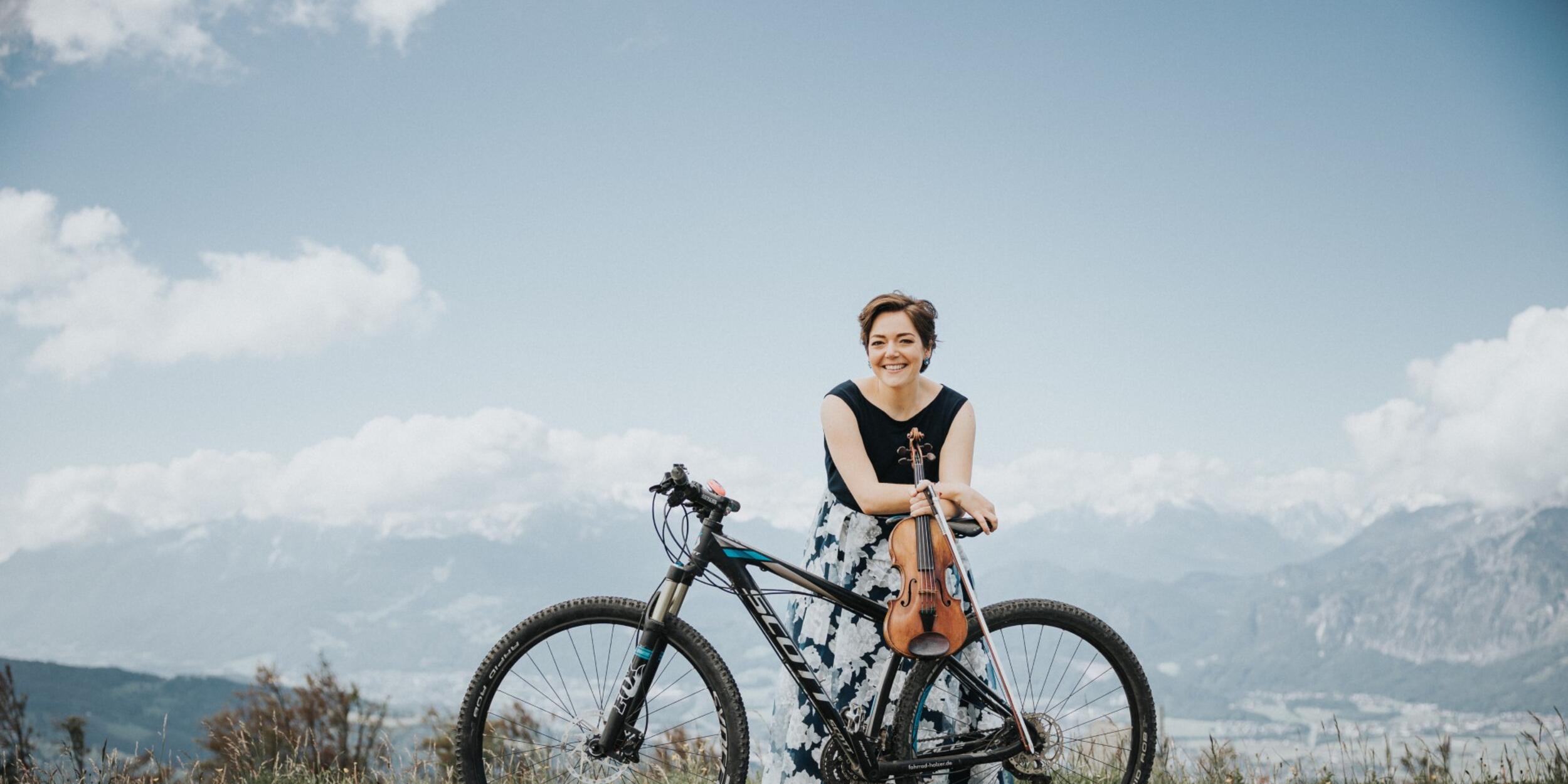
A conversation with Benedikt Gurtner about a cappella singing, working in an ensemble, the importance of music for children and society, and the social value of making music together.
+++ Registration for the entrance examination for performance programmes (BA, MA, PGL) and stage design still possible until 28th February 2026 - all further information on the course pages! +++

The versatile and renowned violinist, project manager and lecturer Franziska Strohmayr grew up in Augsburg and came to Salzburg to study, where she still lives today after graduating from the Mozarteum University under Prof. Martin Mumelter and Prof. Wolfgang Gratzer and from the Guildhall School of Music and Drama in London under Prof. Jacqueline Ross.
Franziska Strohmayr,
Violinist
Salzburg
Franziska Strohmayr regularly performs as a soloist and chamber musician at renowned festivals and concert series, including the Musikfest ION Nuremberg, the Ammerseerenade Classical Music Festival, the Carl Orff Festival, the BachZeit Festival Mondsee and Toujours Mozart of the German Mozart Society. She has a special collaboration with composer Wilfried Hiller, who has dedicated several works to her, which have been published by Schott Verlag. She has received national and international awards such as the 2nd prize Giovani Musicisti Treviso, the 2nd prize Città di Piove di Sacco Padua and the Kulturförderpreis Stadtbergen. Her discography includes CD productions with TYXart and her own label Leni Records, including the complete works for solo violin and violin & piano by Wilfried Hiller, as well as solo works by H. I. F. Biber, G. P. Telemann and J. S. Bach.
For the cultural biathlon ‘Women in the Province of Salzburg’, she was awarded the City of Salzburg's Prize for Art and Culture and was named Newcomer of the Year by the PRO SALZBURG Provincial Foundation. Franziska Strohmayr plays a violin by Antonio Gragnani, Livorno, 1759.
You say that one of your great passions is organising and implementing musical projects and that you are committed to thinking about art and culture in an entrepreneurial way. Why do you need economic know-how for art and culture?
It is very fulfilling as an artist to turn your own creative ideas and projects into reality. You create something completely new that previously only existed in your imagination. In the process of sharing this idea with other artists and the audience, the artistic design is the most important part. Another part is the responsibility surrounding the artistic idea: solidly managing and building up supporting pillars such as financing, advertising, rehearsals and contracts.
In Salzburg, art and culture are part of the city's identity. Here, opportunities have been and continue to be created for artists to implement projects, network and find support. Sometimes you have to search a little to find what suits you. This could be classic project funding or a work scholarship from the city and state, advice and networking through the Kunsthilfe e.V. association, a very affordable studio through the Super Initiative e.V. association, or a low-threshold entry into your first exhibition through the city galleries. The list is long, and formats such as KultNetz, Salzburg's networking fair for all artists and cultural professionals, are good opportunities to engage in exchange with colleagues. Looking back, the beginning is the hardest for many artists (including me): you have to dare to go out, talk to people, and maybe fail a few times. This happens again and again, but actively overcoming your fear is much more rewarding than passively waiting for something to happen.
The Mozarteum University recently launched a service point called Startup and Founding Service. You are in charge of this service.
Yes, the Start-up and Founding Service is there for all students, employees, and alumni who have questions about self-employment, need advice on implementing an idea or project, or discover something in the course of their research that they would like to protect as a new method, product, or digital programme and then make available and known to society.
I see myself as a stopover, a pillar in the service offering. But I would like to see it become compulsory to learn administrative matters over four semesters. As an artist, you need to know how to write an invoice, how insurance works and how to pay tax on your income. As a student, I only focused on the things I needed for my exams or that particularly interested me. You can't blame students for not knowing these things. But we should make sure that they learn them at university, i.e. integrate them into the curriculum as compulsory subjects. I'm not upset when someone simply sends me an email and asks questions. It's meant to be a low-threshold service. In June, the Kultur-Netz-Messe (Culture Network Fair) took place for the first time in Salzburg, with offerings from over 40 exhibitors. I was there with a workshop. You can learn a lot from such offerings.
Artistically, you also venture beyond classical concert formats. You have received awards for your Kulturbiathlon projects. How did these projects come about?
I had previously performed a series of concerts featuring all of J. S. Bach's solo sonatas and partitas, and I wanted to perform this repertoire in other venues. That was the beginning. I enjoy travelling, but since travelling involves financial expense, I thought of a concept that could be implemented cost-effectively. The idea of travelling by bicycle attracted a lot of attention – funnily enough, less because of the programme than because of the concert tours by bicycle. I didn't stay in hotels either, but with host families. One of the most important gifts I take away from these trips is the hospitality I experienced in so many different places and from so many different people. I was also able to experience a lot of ‘all-round care,’ from barbecue evenings to city tours. These were very positive, very formative and enriching experiences. This format generated a lot of interest and enabled me to increase my profile. The proceeds from the first tour to Leipzig in 2019 went to ‘Life Music Now,’ which meant I was also able to use churches as performance venues without having to pay rent.
In July 2021, I was on the road with the cultural biathlon ‘Women in the Province of Salzburg’. And in the spring of 2022, I travelled from Augsburg via Salzburg to Innsbruck, Bolzano, Trento, Montepulciano and Rome, giving a total of twelve concerts in selected churches and covering a good thousand kilometres within a month. I had incredible fun being on the road – I didn't expect that. You can also submit such projects to various funding programmes, but you have to adapt them from time to time and see how you can earn money with which ideas. Of course, this doesn't happen by itself.
You are also committed to gender equality. What can female artists contribute to this issue?
A great deal. Art is a very effective way of reaching people. Art doesn't always have to have a message, but when it's appropriate, art is a wonderful means of addressing issues. I can't just accept things that I don't agree with and carry on living as before. You have to stand by your opinions. In my opinion, women should be allowed to enter the priesthood, and I also conveyed this message in Rome. The responses varied, but I also received a lot of encouragement.
We got to know each other when the Mozarteum University was looking for accommodation for Ukrainian students in Salzburg. You took in a drama student for three years. Why?
I am lucky enough to live in my family's apartment, which has a lot of space. I am very grateful for that, but I know that others are not so fortunate. After the outbreak of war in Ukraine, I saw taking in a student as a way to help. I can't go to Ukraine to help, but this was something I could do within my means. No one can solve big problems alone, but each and every one of us can make a small contribution within our own means, and that's what I tried to do. I wasn't alone, either, but part of a community.
You play in very different ensembles, including with light installations and acrobatics. How flexible do you have to be as a violinist and musician today?
I did my doctorate on Carl Orff and string instruments and have a wide range of interests in the arts. I studied Carl Orff as a ‘theatre person,’ which fascinated me greatly. As a classically trained musician, I am familiar with the competitive pressure among musicians and therefore find it very enjoyable to work in a team with other artists from different genres.
What has changed in the everyday life of musicians in recent years? Have you observed any changes?
I do feel that there is currently a strong awareness of one's own situation. Perhaps ‘Corona’ also marks a certain change. Out of necessity, people suddenly started talking about money – still not happily, but they did. Now there are things to refer to, such as the orchestra traffic light in Germany, where all temporary fees are published. There has also been a slight shift towards solidarity, although I'm not sure if there might not be setbacks again. Mental health is now also being discussed, although physical health still feels like a taboo subject. Illness, its consequences and family planning are still hardly ever discussed in the professional context of artists.
Are there things that, from today's perspective, were neglected during your training?
Perhaps tools to reduce students' dependence on their professors. Avoiding power imbalances and feeling at the mercy of others when the relationship with the teacher is not a good fit – although this relationship is naturally very close in the musical field.
Do you have a recipe for getting new and young audiences excited about classical music?
If only I did (laughs)! I would say involve young people early on, let them try out lots of things, learn instruments and sing, make music together. No genre divisions. We need to be aware of where this division of genres comes from. Specialisation began in the Romantic period, so it doesn't have a very long tradition. Beethoven, for example, saw himself as a free artist who fulfilled a ‘higher purpose’ with his compositions. Spitzweg created the image of the poor poet. These are two very strong associations that still ‘stick’ with us today.
What advice would you give your younger self?
Perhaps I was too strict with myself in many areas. In some areas, you have to be disciplined and strict, but not in everything.
What message do you want to convey with your art?
I want to enrich people with my art.
If you could wish for anything, who would you like to make music with (regardless of any obstacles)?
I would like to realise an artistic project with Cecilia Bartoli.